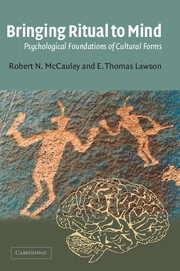Book contents
- Frontmatter
- Contents
- List of figures
- Preface
- 1 Cognitive constraints on religious ritual form: a theory of participants' competence with religious ritual systems
- 2 Ritual and memory: frequency and flashbulbs
- 3 Two hypotheses concerning religious ritual and emotional stimulation
- 4 Assessing the two hypotheses
- 5 General profiles of religious ritual systems: the emerging cognitive science of religion
- Notes
- References
- Index
4 - Assessing the two hypotheses
Published online by Cambridge University Press: 02 December 2009
- Frontmatter
- Contents
- List of figures
- Preface
- 1 Cognitive constraints on religious ritual form: a theory of participants' competence with religious ritual systems
- 2 Ritual and memory: frequency and flashbulbs
- 3 Two hypotheses concerning religious ritual and emotional stimulation
- 4 Assessing the two hypotheses
- 5 General profiles of religious ritual systems: the emerging cognitive science of religion
- Notes
- References
- Index
Summary
Chapter overview
In this chapter we shall argue for advantages of the ritual form hypothesis over the ritual frequency hypothesis. We shall take up a wide array of considerations bearing on the two hypotheses' merits. These considerations are of two broad sorts concerning theoretical and empirical matters. We shall address theoretical and conceptual matters first in the next section, since they will help to set the stage for a fair evaluation in the remaining sections of the hypotheses' empirical predictions.
In the first section we shall defend the greater theoretical depth of the ritual form hypothesis. The argument we make in its behalf has two parts. First, we shall take up some persistent conceptual problems with the ritual frequency hypothesis. We shall argue that precisely the kinds of theoretical distinctions that the ritual form hypothesis makes are necessary to remedy these ambiguities. Second, we will show that the ritual form hypothesis isolates a more fundamental cognitive variable than either the ritual frequency hypothesis or Whitehouse's larger theory of religious modes, since ritual form is a conspicuous factor – probably the principal factor – influencing the unexplained, independent variable of the frequency hypothesis, viz., rituals' performance frequencies.
In the remainder of the chapter we turn to the hypotheses' comparative predictive and explanatory strengths with regard to the empirical facts. On pages 139–146 we shall contend that both Whitehouse's general theory and the ritual frequency hypothesis are less well equipped than our theory of ritual competence and the ritual form hypothesis to handle the explanatory problems we mentioned in the previous chapter concerning the uniformity of Whitehouse's doctrinal and imagistic modes.
- Type
- Chapter
- Information
- Bringing Ritual to MindPsychological Foundations of Cultural Forms, pp. 124 - 178Publisher: Cambridge University PressPrint publication year: 2002



